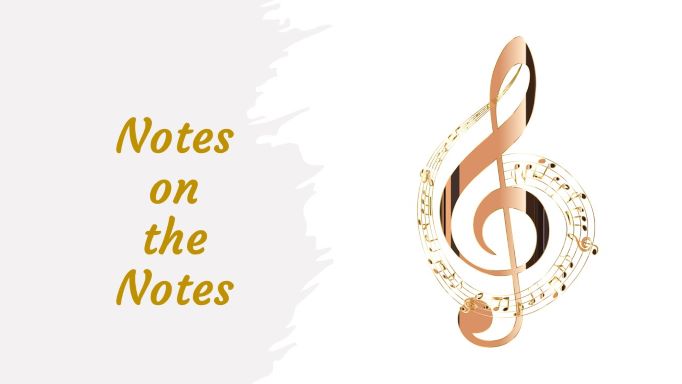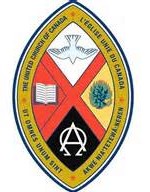Notes on the Notes – April 16, 2023

Second Sunday of Easter/Baptism
This week’s music:
“Praise to God, Your Praises Show” (VU #875 v 1-3)
“Praise to God, your praises show, Hallelujah!
Saints within God’s courts below, Hallelujah!
Angels round the throne above, Hallelujah!
All that see and share God’s love. Hallelujah!
Earth to heaven and heaven to earth, Hallelujah!
Tell the wonders, sing God’s worth, Hallelujah!
Age to age and shore to shore, Hallelujah!
Praise God, praise forevermore! Hallelujah!
Praise to God, great mercies trace, Hallelujah!
Praise this providence and grace, Hallelujah!
All that God for us has done; Hallelujah!
Praise to the all-glorious One. Hallelujah!”
Our opening hymn is a paraphrase of Psalm 150. The psalmist encourages us in Psalm 150 to praise God every day and in every part of our lives no matter how good or bad. We are reminded that God is great all the time, not half the time or just on Sunday. The words were published by Henry Francis Lyte in 1834 (updated in Voices United for inclusivity). It is not known whether the tune was a Welsh folk melody written down by Robert Williams, or if he composed the music himself (1817).
See the Tabernacle Choir sing the hymn at: https://www.yout-ube.com/watch?v=MnqxIJo7syE
“A New Creed”
“We are not alone, we live in God’s world.
We believe in God:
who has created and is creating,
who has come in Jesus, the Word made flesh,
to reconcile and make new,
who works in us and others
by the Spirit.
We trust in God.
We are called to be the church:
to celebrate God’s presence,
to live with respect in Creation,
to love and serve others,
to seek justice and resist evil,
to proclaim Jesus, crucified and risen,
our judge and our hope.
In life, in death, in life beyond death,
God is with us.
We are not alone.
Thanks be to God.”
The music for this setting of the New Creed was composed by Richard Hall. The words are a statement of the beliefs of the United Church of Canada. They give us a centering point as we journey through our life of faith. To learn more about the history of this statement of faith, please go to: http://www.windsorparkunitedchurch.com/a-new-creed/
“The Doors Were Locked”
“The doors were locked, the voices hushed,
Confusion filled the air,
When suddenly the risen Christ
Appeared among them there.
“Peace be with you,” he greeted them.
“Come see my hands and side.
I send you now as I was sent,
The Spirit as your guide.”
Now one was absent from the room,
For Thomas was away.
When others told what they had seen
His judgement would not sway.
“Unless I touch his wounded side
And feel the marks of nails,
Unless I see with my own eyes,
My skeptic’s mind prevails.”
Another night in that same room,
Disciples standing by,
“Peace be with you,” Christ said,
And then looked Thomas in the eye.
“Come see the nail marks on my hands,
Reach out and touch my side” –
An invitation to his friend
To put his doubts aside.
Did Thomas know the world had changed
One morning in a tomb?
He simply said, “My Lord, my God,”
Within that silent room.
Christ did not chide his doubting friend,
But offered him instead
God’s boundless and redemptive grace:
“Peace be with you,” he said.”
This hymn is a retelling of the Thomas story from the gospel of John. The words were written by Jacque B. Jones (2014). We will be using a tune often attributed to Franz Joseph Haydn (ca 1790), which may be familiar as the tune used for the hymn, “I Sing the Mighty Power of God” at Voices United #231.
“Here We Stand, Lord”
“We are gathered in this place, O Lord,
Joined in worship and in prayer.
Come and touch us with Your grace, O Lord;
Keep us always in Your care.
Help us show our faith and love
In all we say and do
As we follow in Your way, O Lord,
Help us put our trust in You.
Here we stand, Lord, Yours forever.
You have called us to spread Your Word.
Hand in hand, Lord, we’ll serve together,
Sharing Your light with all the world.
To this fellowship we come, O Lord,
Joined in gratitude and praise.
In Your spirit we are one, O Lord,
Blessed in many special ways.
Help us share the joy and peace
We find in knowing You.
May the wonder of Your Love, O Lord,
Show in everything we do.
Here we stand, Lord, Yours forever…
We will sing in glory,
Voices joined clear and strong.
We will go forth telling your story,
And all the world will hear our song.
This is our song.
Here we stand, Lord, Yours forever…
We are Yours, Lord.
Here we stand!”
This anthem of commitment was written by Don Besig and Nancy Price in 2000. It was composed in celebration of the 100th anniversary and dedication of a new church for First Lutheran Church in Missoula, Montana.
“Let Trumpets Sound”
“Let trumpets sound and voices sing!
Let all on earth their praises bring!
For Christ has conquered sin and death
And given life eternal breath. Amen.”
Our offering response has words written by John H. Danner for the tune OLD 100TH, more familiar as the doxology, “Praise God from Whom All blessings Flow.”
“Thine is the Glory” (VU #173)
“Thine is the glory, risen, conquering Son:
Endless is the victory thou o’er death hast won.
Angels in bright raiment rolled the stone away,
Kept the folded grave-clothes where the body lay.
Thine is the glory, risen, conquering Son:
Endless is the victory thou o’er death hast won.
Lo, Jesus meets us, risen from the tomb!
Lovingly he greets us, scatters fear and gloom.
Let the church with gladness hymns of triumph sing,
For the Lord now liveth: death has lost its sting.
Thine is the glory, risen, conquering Son:
Endless is the victory thou o’er death hast won.
No more we doubt thee, glorious Prince of life;
Life is nought without thee: aid us in our strife;
Make us more than conquerors, through thy deathless love;
Bring us safe through Jordan to thy home above.
Thine is the glory, risen, conquering Son:
Endless is the victory thou o’er death hast won.”
On this second Sunday of Easter, we again proclaim the wonder of the resurrection. The French hymn “A toi la gloire” may have been derived from an earlier German Advent hymn set to this tune. The French text was first published in Chantes evangeliques (1885), with the words attributed to Edmond Louis Budry. Richard Birch Hoyle translated the French text into English in 1924. The tune is derived from the chorus “See the conquering hero comes” in Handel’s oratorio Judas Maccabaeus (1747). The hymn is also known as “Thine Be the Glory.”
Hear a choral version at: https://youtu.be/gZz5fO2e1Cc
Hear the hymn on organ at: https://youtu.be/YZJL8pwLu8A
“Amen, Halleluia” (VU #974)
“Amen, amen, hallelujah, amen!
Amen, amen, hallelujah, amen!”
Our benediction response this week was written by Jim Strathdee (1985).
Categories: Notes on the Notes

You must be logged in to post a comment.